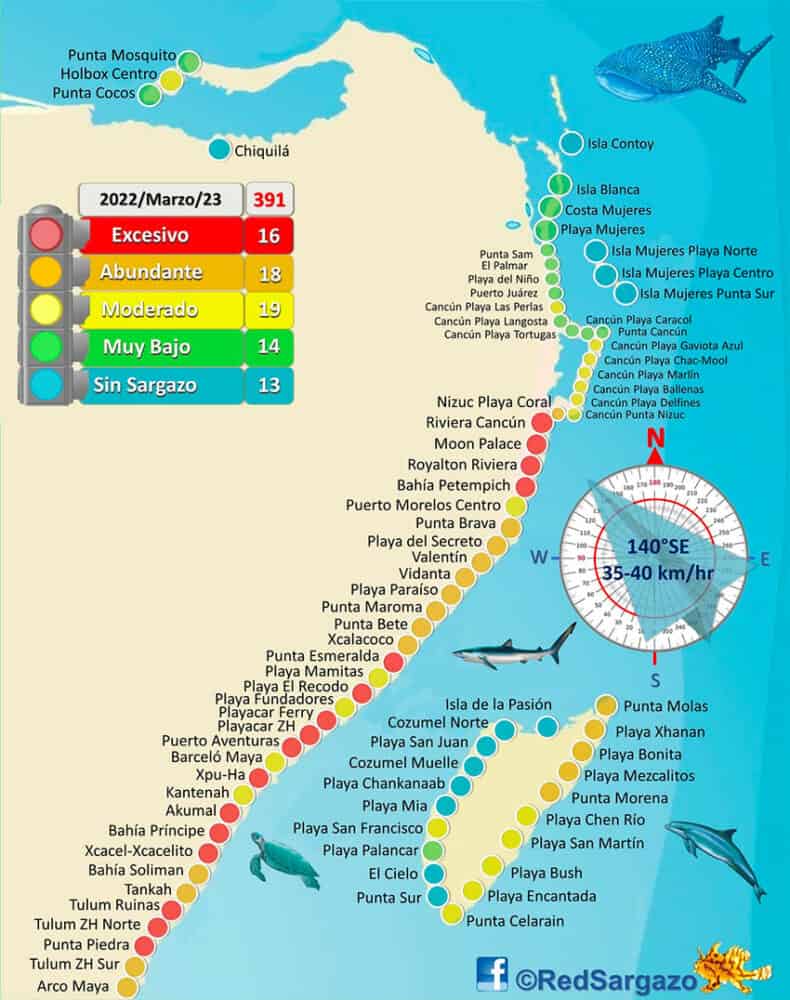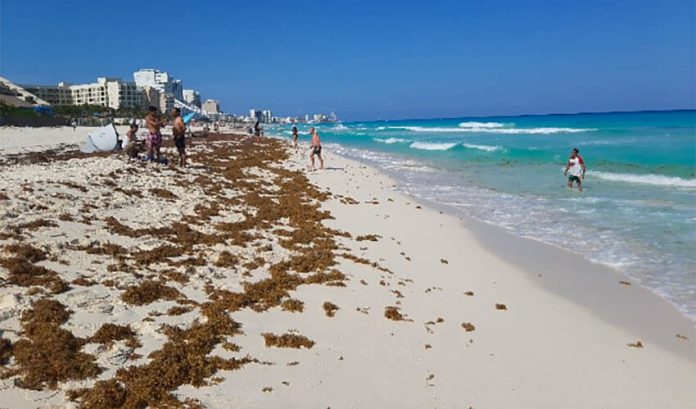Many tourists who visited the Mexican Caribbean over the long weekend were greeted by the early arrival on some beaches of hefty quantities of the smelly seaweed known as sargassum.
Beach destinations in Quintana Roo saw an influx of tourists for the March 19-21 puente, an annual long weekend to mark the anniversary of the birth of former president Benito Juárez, but authorities have warned that this year’s early arrival of sargassum could cause problems for Holy Week, which starts on April 10.
Sixteen beaches in the state already have excessive amounts of sargassum, mainly in the south and on the Riviera Maya, according to the Sargassum Monitoring Network, which published an updated map on Wednesday. Beaches in the north of the state, including in and north of Cancún, are so far less affected.
The network said another map published on Monday by the University of South Florida showed a 1,000 kilometer swathe of sargassum between Jamaica and the Caribbean coast, particularly dense to the north of Honduras, at least some of which should arrive on Mexico’s Caribbean shores at the beginning of April.
The director of the federal office of maritime land zones (Zofemat), Hugo Uribe Nicolás, said the year’s first official sargassum collections started last weekend on Playa del Carmen’s central beaches. More than 50 volunteers and municipal workers collected over 80 tonnes of seaweed using tractors and wheelbarrows.

However, the problem was made worse because the placement of sargassum barriers by the navy had been delayed due to bad weather. The head of the national sargassum strategy, Rear Admiral Alejandro López Zenteno, said that barriers would be installed in Puerto Morelos in the coming days, in Playa del Carmen in the first week of April and then in Tulum immediately after.
He added that a 500 meter barrier had been laid in Mahahual, which will be finished this week.
The director of sales and marketing at the Grand Hyatt Playa del Carmen, Marc André, said he was counting on federal authorities to keep the beaches clean. “The navy has barges to collect sargassum before it lands on the beaches … it causes discomfort, not only visually, but because of the smell,” he said.
The manager of a beach club in Tulum said the seaweed would affect visitor numbers. “Hopefully over the Easter holidays there will be no arrival of sargassum, because that affects the flow of local and foreign visitors,” he said.
Hotel occupancy in some of the state’s primary tourist destinations was around 85% and almost 400,000 tourists visited the Caribbean coast over the long weekend, according to the state Tourism Ministry. It posted photos of pristine beaches on Tuesday, explaining that not all of the beaches in the state are plagued by the seaweed.
Very little sargassum reached Quintana Roo beaches prior to 2014 but very large quantities of the weed have arrived annually since then. Climate change, pollution from fertilizers and changing ocean flows and currents are among the factors cited for the increased quantities, much of which floats up to the Caribbean sea from the Atlantic Ocean off the east coast of South America.
With reports from Milenio, El Sol de México and Reportur
